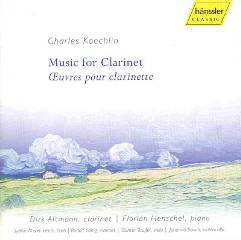Charles Koechlin - Music For Clarinet (2004)
Charles Koechlin - Music For Clarinet (2004)

Clarinet Sonata No. 1, Op. 85 I. Allegro II. Andante quasi adagio III. Finale: Allegro moderato Les confidences d'un joueur de clarinette (The Confessions of a Clarinet Player), Op. 141 I. Romance de Kasper II. Aubade des vendanges III. Le bouquet de fleurs des champs pour Magredel IV. Pastorale V. Musique de Kasper et de Waldhorn pendant le diner chez l'oncle St VI. Marche familiere VII. Valse rustique pour le bal a la fete d'Eckerswir VIII. Rage de Kasper IX. Lamento X. Duo final du Clarinet Sonata No. 2, Op. 86 I. Allegro ben moderato II. Andante con moto III. Allegro Idylle for 2 Clarinets, Op. 155bis 14 Pieces for Clarinet and Piano, Op. 178 I. Andante con moto II. Allegretto III. Tranquillo IV. Tempo de Sicilienne V. Allegretto con moto VI. Serein, bien allant VII. Allegro con moto VIII. Concentre, presque adagio, sans trainer cependant IX. Allegretto con moto X. Andante XI. Allegro con moto XII. Larghetto XIII. Allegro vivo XIV. Allegretto 11 Monodies, Op. 216 I. Le Faune II. Le Soir III. La Mer aux bruits innombrables V. La Chasse d' Artemis X. Le Repos de Tityre Dirk Altmann (Clarinet) Rudolf König (Clarinet) Johanna Busch (Cello) Gunter Teuffel (Viola) Sybille Mahni Haas (French Horn) Florian Henschel (Piano)
If there’s a composer more difficult to pigeonhole than Charles Koechlin (1867–1950), I don’t know who that composer might be. A late starter who compensated by being notably prolific in a wide range of genres beyond the age of 80, Koechlin was also protean in style. Conservatory woodwind professors are fond of him as a composer of sets of accessible miniatures that are useful as recital novelties; connoisseurs of 20th-century orchestral music know him, especially through the Kipling-inspired cycle Le livre de la jungle, as a radical and unique post-Impressionistic voice. In his informative if somewhat ingenuously written notes, clarinetist Altmann cites recent thinking according to which Koechlin is an important link between Debussy and Messiaen, a perspective I find particularly insightful.
The present collection, incorporating most of the music for clarinet solo and with piano, naturally reflects the former musical persona more than the latter, although Koechlin the radical is often perceptible just beneath the surface. The two brief sonatas have a certain folklike quality, and are rich with Koechlin’s favored modal harmonies tinged with his unique form of chromaticism, also displaying the predilection for chords with open fifths that permeates much of his music. The clarinet-writing is not difficult except for an occasional, unexpected excursion into the altissimo register of the instrument.
The suite from Les confidences d’un joueur de clarinette (“The Confessions of a Clarinet Player”) is a set of vignettes intended for a film project that was never realized. (Koechlin was intensely interested in this new medium; as many readers will know, his Seven Stars’ Symphony has nothing to do with things cosmic, but rather portrays early Hollywood celebrities.) Many are for clarinet unaccompanied; since the protagonist’s friend is named Waldhorn, several other movements are for clarinet and horn. The music, accordingly, has a pastoral quality, and much of it is completely diatonic. The very brief Idylle and the op. 178 pieces are also rather harmonically and technically conservative, posing no great challenges for the clarinetist.
The musical high point of the disc comes with the Monodies, written in 1948; it is unfortunate that Altmann has given us only half of them. These unaccompanied pieces feature the widest range of expression and of musical language on this recital; all told, half of the Monodies are unmetered, and since harmony, not rhythm, was Koechlin’s greatest talent, some of the slower pieces can bog down rhythmically. But others, such as No. 3, “La mer aux bruits innombrables,” a tour-de-force involving rapid arpeggios in fourths, extensive use of the altissimo register, and other formidable technical challenges, are first-rate, uncompromising music clearly intended for masters of the instrument.
Fortunately, that is precisely what Altmann proves to be. Principal clarinet of the Stuttgart Radio Symphony since 1985, he is a former student of the superb Karl Leister, for decades virtually the only German clarinetist whose sound American clarinetists have widely admired; Altmann, who plays French Buffet clarinets—unusual, I believe, in Germany—has a dark, beautifully controlled tone that I think mavens on both sides of the Atlantic will find pleasing. He also has a monster technique, polishing off the handful of technically difficult pieces cleanly and accurately, and negotiating the high notes without showing any hint of intonation problems or sign of strain.
Virtually all of the music on this disc seems to be unavailable elsewhere, meaning it would be self-recommending even if it were not so well played. As it is, it is a must for clarinetists and for Koechlin fans. ---FANFARE: Richard A. Kaplan, arkivmusic.com
download (mp3 @320 kbs):
yandex 4shared mega mediafire zalivalka cloudmailru uplea
Last Updated (Tuesday, 09 February 2016 17:09)








